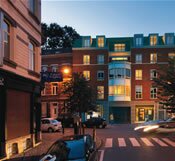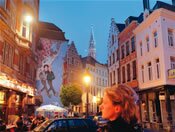Inflight Magazine of Brussels Airlines
Welcome to the Inflight Magazine of Brussels Airlines
A smart move
 Brussels is one of the most cosmopolitan cities in which to put down roots, as Laura Latham discovers
Brussels is one of the most cosmopolitan cities in which to put down roots, as Laura Latham discovers
For those seeking great employment opportunities, good public services and infrastructure as well as a solid education system, Brussels has it all. The city is also seeing the arrival of a wave of funky new bars and restaurants and is proving popular with a vibrant and cosmopolitan young crowd.
Work The job market in Brussels is generally thriving. The EU Commission needs hundreds of staff, as do the various lobby groups, civil service departments and legislative bodies. Then there are the many multinationals that have settled in the city and all the hospitality and retail providers essential to everyday urban living.
The job market in Brussels is generally thriving. The EU Commission needs hundreds of staff, as do the various lobby groups, civil service departments and legislative bodies. Then there are the many multinationals that have settled in the city and all the hospitality and retail providers essential to everyday urban living.
Relocator John Blakeway, of Andrews Roe, has been settling people in Brussels for 12 years. He says lots of people move here to work in the pharmaceutical industry, which has a huge presence, alongside newer industries such as IT and legal services. “Businesses like Brussels because it puts them in the hub of Europe,” he explains. “There’s a broad mix, so the economic profile of Brussels is that there’s a bit of everything.”
Blakeway finds that many people come to Brussels on short-term contracts of about two or three years. Brussels’s bureaucracy is legendary and he says most people need help wading through the tax, social security and employment documentation that new arrivals have to acquaint themselves with. Although EU nationals don’t need a visa or work permit, they do still need to register with the town hall and have to pay income tax which, at almost 60%, is one of the highest in Europe. Non-EU nationals will need visas and work permits, all of which takes time and effort to organise.
Property When moving to any new city, it’s important to pick the right area to live in. Singletons won’t want to be in the suburbs and families with children will need easy access to good schools as well as a comfortable commute to work.
When moving to any new city, it’s important to pick the right area to live in. Singletons won’t want to be in the suburbs and families with children will need easy access to good schools as well as a comfortable commute to work.
Blakeway says there is plenty of property to buy or rent in Brussels and the surrounding suburbs. Buying, as opposed to renting, can be expensive – he warns those who want to own their own place that they need to add 20% to the cost of any purchase to cover legal fees and taxes. The majority of families choose to live in the Greater Brussels area, usually in popular suburbs such as Woluwe-Saint-Pierre, Tervuren or Wezembeek-Oppem. Various areas have attracted pockets of expats because they offer services and schools geared up for the needs of a particular overseas community.
In the city centre, the classic 19th-century apartment buildings are expensive and difficult to come by and there are a lot of ugly blocks built in the 1960s and 70s, although much of this type of property is undergoing refurbishment. Some luxury developers are moving into the city, offering high-spec apartments in popular areas, such as the European Quarter near the European Commission and Ixelles, a chic, bustling community.
According to Eoghan Quinn, sales agent for the Thornsett property development group, property in Brussels is appreciating at a rate of between 12% and 15% per year right now, with apartments costing from €2,500 to €3,500 per square metre, depending on location and quality. John Blakeway says buyers can expect to pay from €300,000 for a nice central apartment and around €700,000 for a four-bedroom family home in a good suburb.
Education
Due to the mix of nationalities, Brussels’ schools cater better to the international community than most cities. People tend to live in areas with schools servicing their particular needs. Tervuren, for example, has several British-oriented
schools, including the British School of Brussels. Germans tend to favour Wezembeek-Oppem for similar reasons.
Many Japanese and US families head for pretty Watermael-Boitsfort, the location of the International School of Brussels, which takes children aged two to 18. Or they settle in Waterloo, home to St John’s International School, which offers high-level tuition and the International Baccalaureate to students from 60 nationalities.
For older students or those who want to earn while they learn, there are several respected international universities and business schools. Université Libre de Bruxelles and Vrije Universiteit Brussel run traditional degree subjects, while business colleges, such as United Business Institutes, offer highly regarded BA and MBA programmes.
Lifestyle
French and Dutch are widely spoken in Brussels, but for expats, English and some French are usually enough to get by. Although most Dutch speakers also speak excellent English, it’s useful to learn at least some basic phrases.
Medical care in Belgium can be expensive for non-EU nationals and Blakeway advises anyone moving here to take out an insurance policy, even though he’s quick to offer that, “healthcare in Belgium is very efficient.”
Three other great European cities to relocate to:
 London
London
Currently one of the most exciting cities to relocate to, London offers high employment prospects, good international schools and private healthcare. It also has some of the finest restaurants and bars in Europe and a lively cultural and arts scene. The downside is that it’s officially the most expensive world capital when it comes to property (from £4,800 (€7,050) per square metre to £14,000 (€20,570) in prime areas) and general living costs are also high.
Barcelona
Sunny and fun, the Catalan capital has its own beach, a trendy population and a chilled, outdoor lifestyle. Like much of Spain, life is very family oriented and revolves around simple pleasures of eating, relaxing and a good social life. Down sides are the expensive property, which has risen astronomically in the past few years, and petty crime. Professional employment may be limited unless you speak Spanish and Catalan well.
Berlin
Few places do art and culture as well as Berlin, from street theatre and cutting-edge clubs to classical music and museums. The city also has an active, outdoor lifestyle in summer. Property is extremely cheap and public services are mainly new and highly efficient. There are several good international schools and quality healthcare services. Problems include Germany’s long recession and high unemployment, which may make finding work difficult, and there is a high cost of living compared to other European cities.
Contacts
■ Andrews Roe, tel. or , www.andrewsroe.com
■ The Thornsett Group, tel.
or , www.thornsettgroup.com
■ British School of Brussels, tel. , www.britishschool.be
■ St John’s International School, tel. , www.stjohns.be
■ The International School of Brussels, tel. , www.isb.be
■ United Business Institutes, , www.ubi.edu
FR » Un changement positif
Bruxelles est l’une des villes les plus cosmopolites qui offre tous les atouts pour s’implanter avantageusement. Un état des lieux de Laura Latham
Pour ceux qui recherchent de bonnes opportunités d’emploi, un niveau élevé de services publics et d’infrastructures ainsi qu’un solide système d’éducation, Bruxelles est une place de choix. De plus, une nouvelle vague de nouveaux bars branchés et de restaurants est en train de déferler sur la ville, avec dans son sillage l’émergence d’une population jeune et cosmopolite.
Emploi
De manière générale, le marché du travail à Bruxelles est florissant. La Commission européenne recrute des centaines d’employés tout comme les divers groupes de lobby, la fonction publique et les organes législatifs. On dénombre à l’heure actuelle de nombreuses compagnies multinationales et les jobs dans les secteurs de l’hébergement et de la distribution sont essentiels dans la vie urbaine de tous les jours.
Immobilier
On trouve à Bruxelles une offre abondante de biens immobiliers à acheter ou à louer ainsi que dans les banlieues proches. Certaines zones ont déjà attiré un nombre considérable d’expatriés, et elles offrent des services et un système d’éducation taillés sur mesure pour les besoins particuliers de ces communautés étrangères. Dans le centre ville, les immeubles classiques à appartements du 19e siècle sont relativement chers et difficiles à obtenir.
Education
En raison de ce mélange des nationalités, les écoles de Bruxelles pourvoient un enseignement parfaitement adapté à la présence de sa communauté internationale. Quelques universités internationales de renom et des écoles de business répondent aux besoins des étudiants plus âgés et de ceux qui désirent continuer à se former au cours de leur vie professionnelle.
Style de vie
L’anglais et le français sont les langues les plus usitées, le néerlandais étant également une langue officielle.
NL » Goed wonen
Brussel is een van de meest kosmopolitische steden om zich te vestigen. Dat stelde Laura Latham zelf vast…
Op zoek naar goede werkmogelijkheden, efficiënte openbare diensten, een degelijke infrastructuur en een kwaliteitsvol onderwijssysteem? Dan is Brussel the place to be. De stad zag de komst van een groot aantal nieuwe restaurants en bars, en blijkt vooral in trek te zijn bij een levendig en kosmopolitisch jong publiek.
Werk
De arbeidsmarkt in Brussel doet het vrij goed. De Europese Commissie heeft nood aan honderden mensen, net als de verschillende lobbygroepen, overheidsinstellingen en wetgevende instanties. Deze gastvrije stad telt talloze multinationals, en voor het alledaagse stadsleven is er veel winkelpersoneel nodig.
Eigendom
In en rond Brussel worden heel wat woningen te koop of te huur aangeboden. In wijken waar vooral expats zich vestigen, vind je diensten en scholen die afgestemd zijn op de behoeften van een buitenlandse gemeenschap. In het stadscentrum zijn vooral de oude, 19de eeuwse appartementen felbegeerd, en dus duur.
Onderwijs
Vanwege de vele nationaliteiten liggen Brusselse scholen goed in de markt bij de internationale gemeenschap. Er zijn ook verschillende vermaarde internationale universiteiten en business-scholen bedoeld voor oudere of werkende studenten.
Lifestyle
In Brussel spreekt men vooral Frans en Engels, maar ook het Nederlands is er een officiële taal.
Leave a Reply
